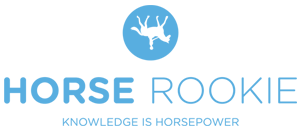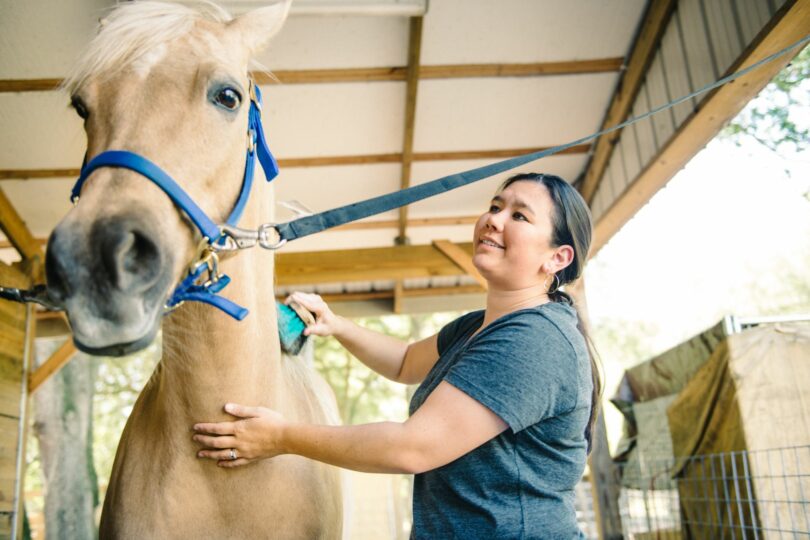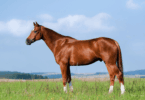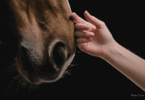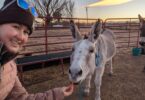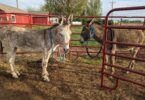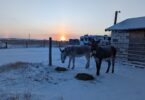Clean Up Your Grooming Vocab
If you’re new to horses, then you may be feeling a bit overwhelmed by the topic of grooming—it can be information overload! Blog posts and social media groups are full of conflicting advice about topics ranging from nutrition to cantering the perfect 20-meter circle. But when it comes to grooming your horse, you shouldn’t have to feel conflicted.
Grooming your horse is an important activity that promotes your horse’s overall health and well-being. It’s also fun and strengthens your bond. We’ll cover everything you need to know about how to groom your horse, the equipment you’ll need, and how grooming at home differs from at a show.
Grooming: The big picture
Grooming refers to the process of cleaning and general care of your horse’s coat, mane, tail, hooves, and skin. It’s important to groom your horse regularly to remove dirt, sweat, and other debris that can lead to skin irritation.
Grooming also stimulates circulation and helps distribute natural oils throughout the coat.
Benefits of Grooming a Horse
There are a variety of benefits to grooming your horse, both for you and your horse. Grooming is an excellent way to bond with your horse, and it’s also an opportunity to check for any lumps, bumps, or injuries.
Regular grooming can also help prevent hoof health problems like thrush and rain rot.
How long does it take to groom a horse?
The amount of time it takes to groom your horse will depend on a few factors, such as the horse’s size, coat condition, and whether you’re doing a full grooming or a quick touch-up.
Generally speaking, grooming a horse takes about 30 minutes from start to finish.
What are different scenarios when you’d groom a horse?
There are several various scenarios in which you might groom your horse.
You might quickly brush your horse before riding to remove any dirt or debris that could cause irritation when rubbed with your tack. Or, you might do more thorough grooming after riding to cool your horse down and remove sweat and mud.
You might also groom your horse before and after a show to ensure they look their best.
Grooming Before a Ride
If you’re planning to ride your horse, grooming them first is always a good idea. This will aid in removing any dirt, sweat, or debris that could cause irritation.
You should focus on the areas where the saddle will sit and under the girth to ensure nothing is going to pinch, rub, or otherwise irritate their skin.
Depending upon how dirty your horse is, it may need only a quick brushing with a stiff-bristled brush to bring the dirt to the surface. You can follow up by using a softer brush to remove finer dirt.
If your horse is covered in dirt or mud, you may need to allot a bit more time for grooming. In cases where your horse has rolled in mud, you may need to start by hosing them down.
If the dirt is dry, you can sometimes remove it with a curry comb followed by a stiff-bristled brush, then finish with a fine bristled brush.
You should also pick your horse’s hooves to remove any clumps of dirt or small stones that can cause bruising to the delicate parts of the foot.
Grooming as Training
Grooming can also be used as a training tool! If your horse is resistant to being groomed, start by teaching them to stand still. Once they’re standing calmly, you can introduce different grooming tools one at a time.
Start with the least intrusive tools, such as a soft brush, and work your way up to more intrusive tools, such as a hoof pick.
If you plan to go to a horse show, you will likely need to clip various areas of their body at some point. Once your horse has mastered manual grooming tools, you can introduce them to the electric clippers.
If your horse is fearful, it’s always a good idea to consult and work with a trainer to make the experience positive for both you and your horse.
As you groom your horse, take your time and talk to them in a calm voice. This will help your horse relax and associate grooming with positive experiences. Unsurprisingly, lots of treats can also make grooming a fun experience!
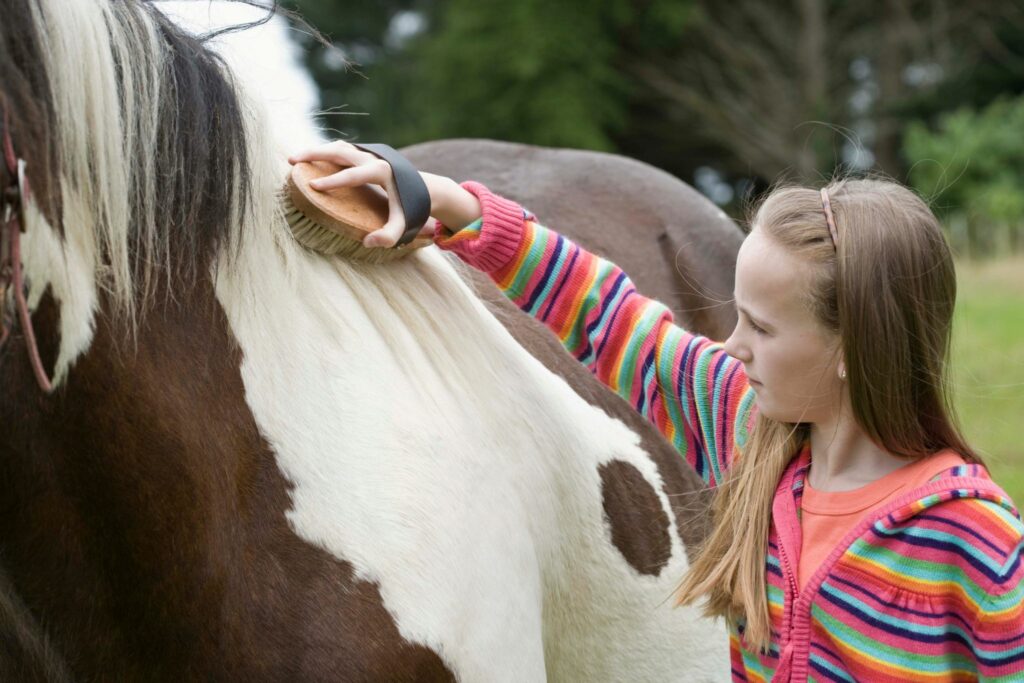
Photo Cred: Canva
Grooming for a Horse Show
If you’re planning to show your horse, there are a few extra steps you’ll need to take in the grooming process before the event. By keeping your horse well-groomed on a regular basis, grooming for a show won’t be too difficult.
Regardless of the type of show, you always want to show your horse off at its best. This typically means starting with a bath, but waterless horse shampoo is another option.
Bathing
Shampoo can strip your horse’s coat of the natural oils that keep it healthy, so you’ll want to limit full baths to no more than once a week. But you absolutely can (and should) hose your horse off with plain water when he gets sweaty to avoid itching and keep his coat in prime condition.
If your horse is white, you can buy special whitening shampoos to bring out the shine. You can also purchase dry shampoo made for horses to spot clean any areas your horse may get dirty between his bath and the show ring.
It’s a good idea to familiarize yourself with the traditional grooming patterns for the discipline which you’ll be showing and then practice at home.
Clipping
Your horse may also need to be clipped over various areas of his body, depending upon the discipline you’ll be showing in.
Clipping should be done within a couple of days before the show, allowing any ‘lines’ to fade.
Most of the time, clipping for a show means trimming rouge leg hair, the hair along the edge of the ears, and the bridle path. You may also need to clip the hair on his body.
Mane, Tail, and Finishing Touches
Some disciplines expect the mane and tail to be banded or braided in a specific way, so you’ll want to practice that at home.
Some people spray a horse-specific finishing spray over their horse just before they enter the show ring. This spray adds an extra sheen to a horse’s coat.
Avoid spraying it under tack because it can make your saddle slide or slip!
Last, you’ll want to consider hoof polish. Depending upon the natural color of your horse’s hooves, you can find black and clear polish.
The polish is a nice finishing touch and adds an extra sheen to your show ring look. But always check your rulebook before polishing! Some classes, such as Ranch
Check the rules though: AQHA shows prohibit any type of hoof polish, and it can be cause for disqualification!
Horse Grooming Tools
There are a variety of horse grooming tools available on the market. Many people have different opinions about which ones are the best, but, ultimately, it’s your decision to make regarding what is best for you and your horse.
Here is a list of some standard horse grooming tools:
Curry Comb
This tool is used to loosen up the dirt and mud in your horse’s coat so that you can easily remove it with a stiff brush.
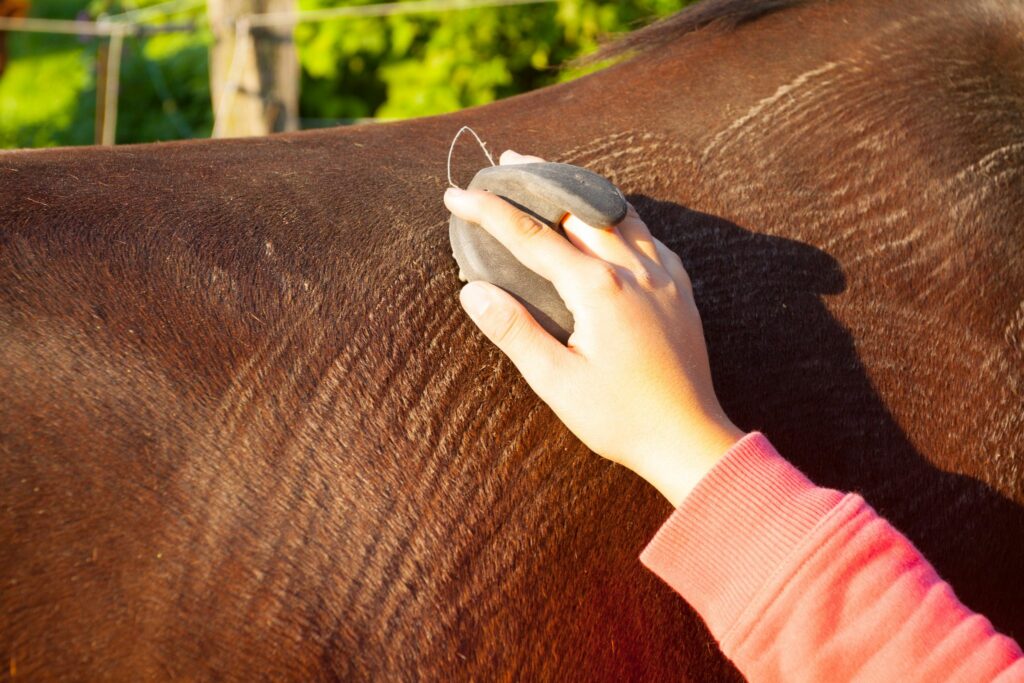
Currying. Photo Cred: Canva
Stiff/Hard Brush
This brush removes most of the dirt and mud from your horse’s coat after you’ve brought them to the surface with a curry comb. Avoid using this brush on sensitive parts of your horse, such as his face or legs.
Soft Brush
Also known as a “body brush,” this brush is used to whisk away stray hairs and dirt after you’ve used a curry comb and stiff brush.
Hoof Pick
This is a must-have tool for every horse owner! You use it to clean out your horse’s hooves before and after riding or turnout. It’s also a good idea to check your horse’s feet daily for any stones or other objects that may be stuck there.
Mane/Tail Comb
You guessed it, this tool is used for combing your horse’s mane and tail! You can find mane and tail combs in various sizes and styles to suit your needs.
You can also use a human hairbrush for your horse’s tail, but we don’t suggest using it for both purposes!
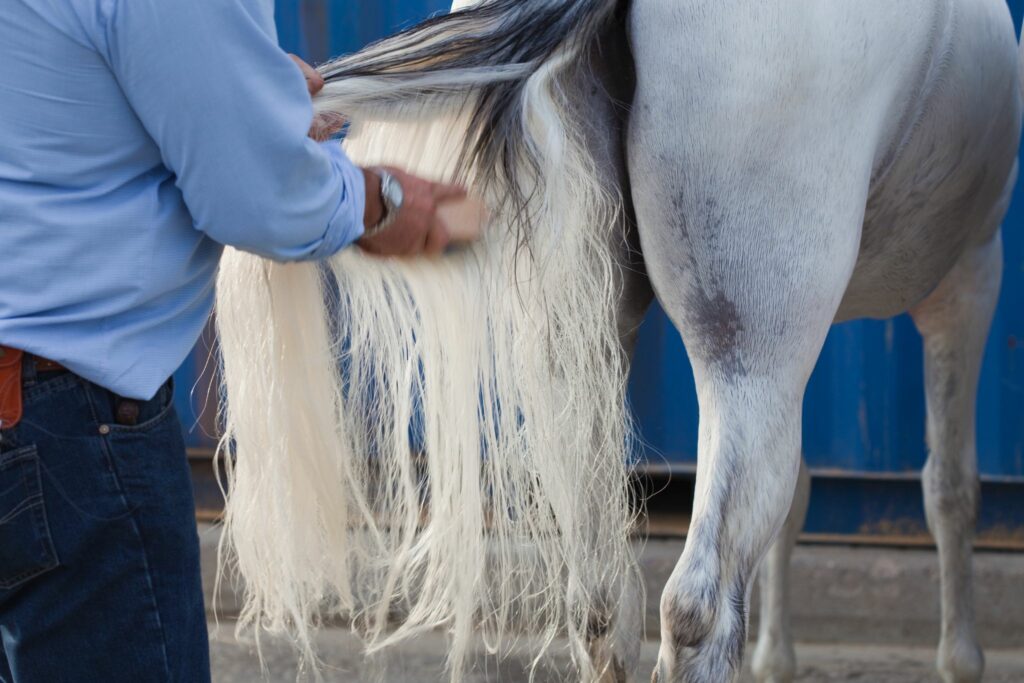
Mane Tail Comb. Photo Cred: Canva
Pulling Comb
This tool is used for thinning out your horse’s mane and tail. It can also be used to help remove knots.
Generally, pulling manes is not recommended these days. Rather, trim them or use a thinning brush.
Scissors
You’ll need a quality pair of scissors to trim your horse’s mane and tail. You may also need them to trim whiskers or other areas of your horse’s coat, depending upon the discipline you’re showing in.
Clippers
You may need clippers to clip your horse’s bridle path, whiskers, and possibly his body. You can find clippers in a wide variety of sizes, price points, and styles to suit your needs.
Shedding Block
This tool is used to help remove your horse’s winter coat. You simply rub it over his body, and the loose hairs will come right off! It can also help remove bot larvae from your horse’s legs.
Sweat Scraper
This tool helps remove excess water from the horse’s coat after a bath. Think of it as a squeegee for your horse!
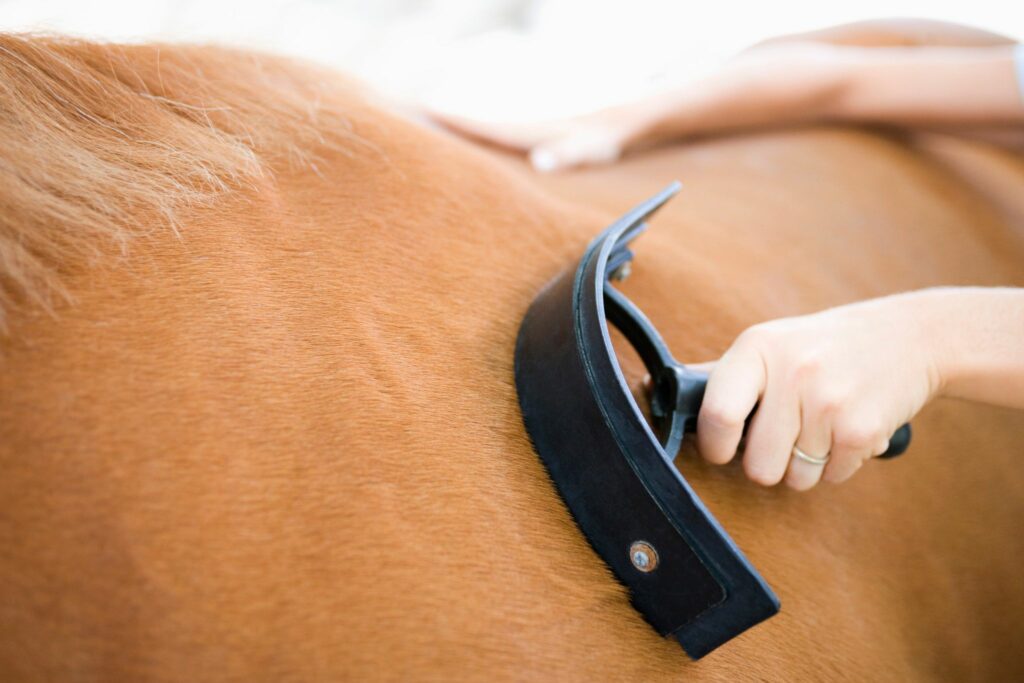
Sweat Scraper. Photo Cred: Canva
Horse Grooms – Yes, That’s a Job
You may think, “I can groom my own horse; thank you very much!” And that’s fine if you have the time and patience to do so. There are most certainly people out there who make their living grooming horses.
If you’re interested in becoming a professional horse groom, here are a few things you should know.
First and foremost, you must be able to handle horses. That means catching them, leading them, tying them, and grooming them. You also need to be comfortable around all kinds of horses – big ones, small ones, young ones, old ones, etc.
You should also be educated and comfortable with the basics of horse care. That includes things like feeding, watering, and turnout.
It’s also essential to be detail-oriented and have a good eye for what looks clean and presentable. After all, part of your job will be making sure the horses you’re grooming look their best!
Last but not least, you need to be able to work long hours on your feet. Grooming horses is a physically demanding job, so you need to be able to handle that.
If you believe that you have what it takes to be a professional horse groom, go for it! It can be a great way to make a living if you love horses. It’s also a great side hustle to help pay for your horse habit.
How much do horse grooms make?
Salaries for horse grooms vary depending upon experience, location, and the type of facility where they work.
Entry-level grooms can expect to make minimum wage or slightly above, while experienced grooms may earn close to $50,000 per year.
Grooms may also follow a specific show circuit, traveling from show to show.
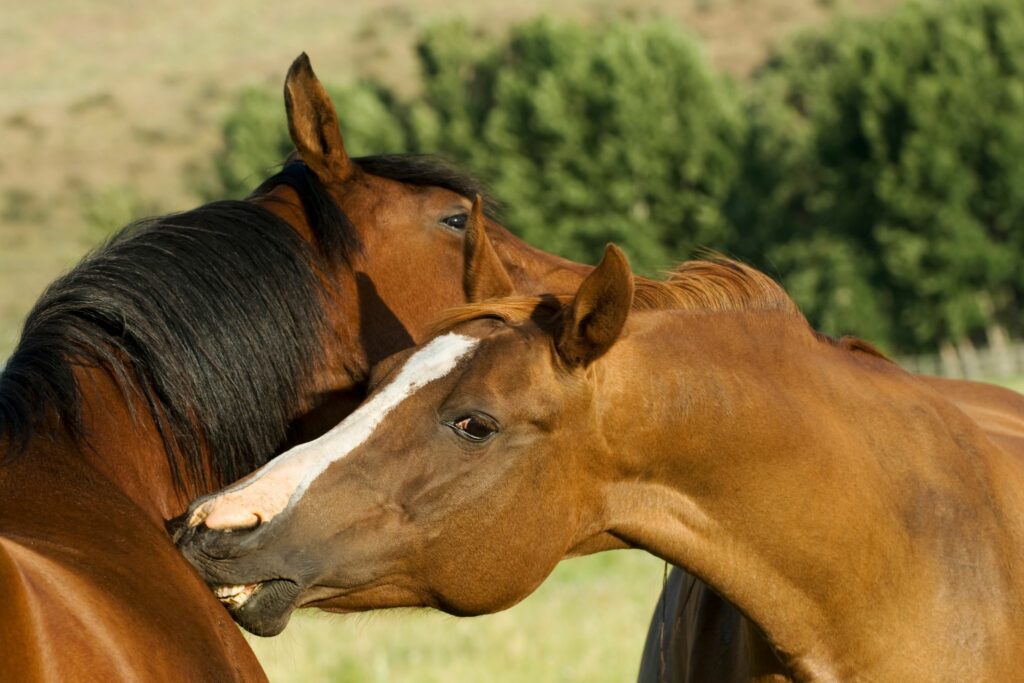
Photo Cred: Canva
Frequently Asked Questions
Q: What is the term for grooming a horse?
Some people may refer to it as simply “grooming,” while others may call it “tacking up,” a term that describes getting a horse ready to ride.
Q: What are the different types of horse grooming?
Horse grooming is done in all kinds of different situations. Daily grooming is performed to keep your horse’s hooves and coat in good condition and detect problems.
Grooming before a ride is done to detect problems and ensure there’s no dirt or irritants under the saddle.
After a ride, you’ll also want to groom to remove dirt and sweat that could cause itching and irritation to your horse.
When grooming before a show, you aim to present the best version of your horse to the judge, especially if it’s for a halter or showmanship class.
Q: What is rubbing down a horse?
Rubbing down a horse is simply the act of using a brush to clean your horse’s coat. It’s usually done after a ride to remove any dirt, sweat, or debris that may be clinging to his coat.
Q: What is a horse groomer called?
A horse groomer, or simply “groom,” is someone who cares for horses. They may be responsible for daily feeding, watering, turnout, and grooming. In some cases, grooms also may travel with show circuits to care for the horses while on the road.
Parting Thoughts
So there you have it, a crash course in horse grooming! Hopefully, this has given you a better understanding of keeping a horse clean and presentable. If you have any questions or specific concerns, always contact your veterinarian or another trusted equine professional.
Happy grooming!
P.S. Enjoy this article? Trot on over to:
- How to Ride a Horse for Beginners (Basics, Safety, Mistakes)
- Horse Photography (Pro Tips, Settings, Editing, Examples)
- Hock Injections 101: How Your Horse Might Benefit
- How Horses Sleep: A to Zzzz Guide to Equine Rest
- How Much Do Horses Cost & How You Can Actually Afford One
- 7 Best Boredom Bustin’ Horse Pasture Toys
- I Want a Horse But Can’t Afford One. Now What?
- 5 Horse Vacuums That Really Suck (In a Good Way!)
Sources
- How to Groom Your Horse – The Spruce Pets
- Beginner’s Guide to Grooming a Horse – Horse Racing Sense
- Horse Groom Annual Salary ($30,491 Avg – Aug 2022) – ZipRecruiter
